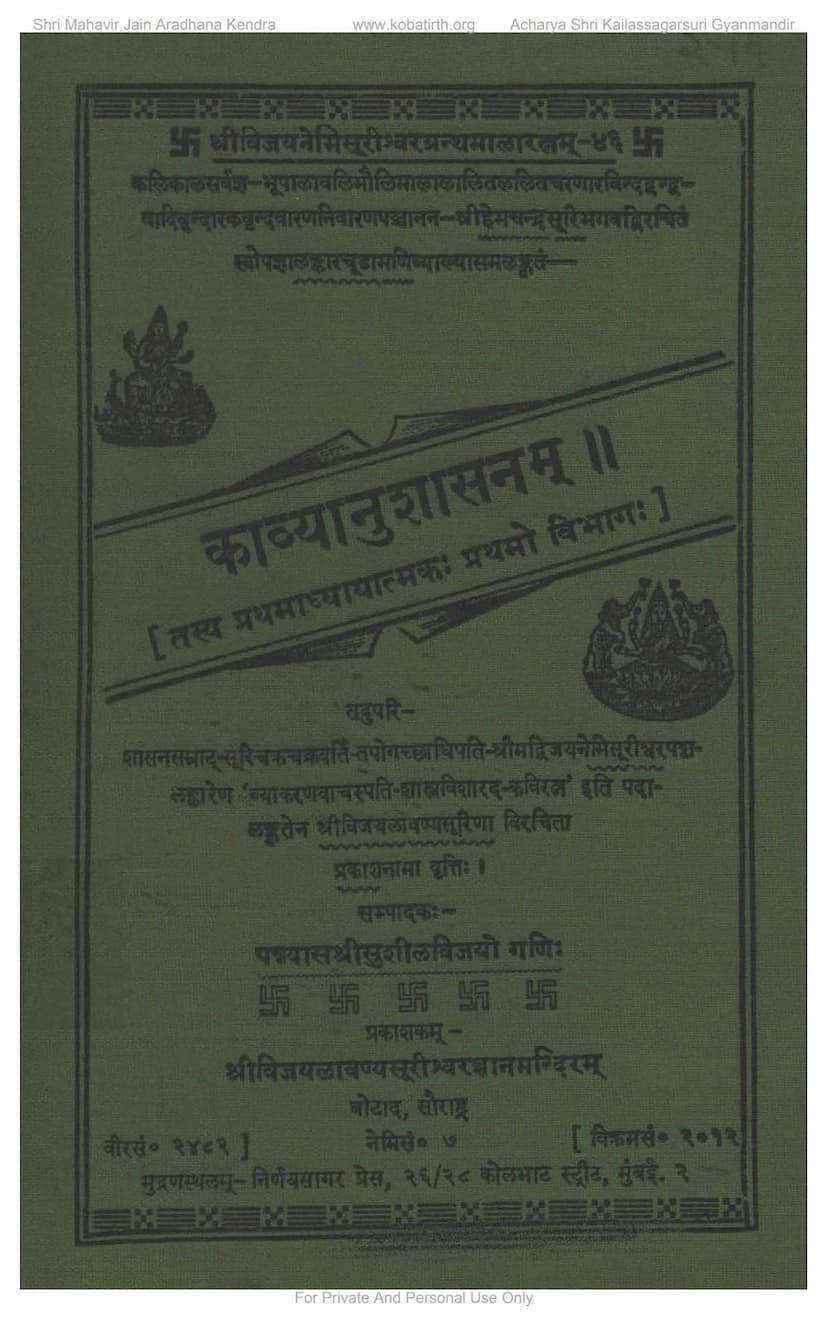Kavyanushasanam
Added to library: September 2, 2025

Summary
Here's a comprehensive summary of the Jain text "Kavyanushasanam" by Sushilvijay Gani, based on the provided pages:
Overall Work:
The text is identified as "Kavyanushasanam" authored by the revered Jain acharya, Shri Hemchandrasuri Bhagwan. This particular edition is enhanced with a commentary titled "Prakasha" (प्रकाश) composed by Shri Vijaylavanyasuri, who adorned the spiritual seat (pattalankar) of the Tapagachha lineage. The entire work is presented as the "Shri Vijay Nemisurishwar Granthamalratnam - 46" and is a significant contribution to Jain literature and the study of poetics. Panyas Shri Sushilvijay Gani is credited as the editor.
Key Components and Content:
-
Original Text & Commentary: The book contains the original Sanskrit sutras of "Kavyanushasanam" by Shri Hemchandrasuri, along with his own commentary, "Alankar Chudamani" (अलङ्कारचूडामणि). It also includes the new commentary, "Prakasha," by Shri Vijaylavanyasuri.
-
Scope of "Kavyanushasanam": The text aims to provide a comprehensive guide to poetics (Kavya Shastra) for aspiring poets and scholars. It covers the essential elements and principles required to understand and create poetry.
-
Editor's Contribution: Panyas Shri Sushilvijay Gani has not only edited the text but also provided a concise summary of the original text (संक्षेपार्थ).
-
Publisher and Support: The publication is by Shri Vijaylavanyasuri Gyanmandir, Botad, Saurashtra. Financial support for the printing of the first volume (covering the first chapter) was generously provided by Shri Sarabhai Nageendas of Patan, in memory of his father, Seth Nageendas Mangalchand.
-
Content of the First Chapter (Prathama Adhyaya): Page 5 provides a detailed table of contents for the first chapter, outlining the topics covered. These include:
- Mangalacharan (invocation/auspicious beginning)
- Purpose of poetry
- Causes of poetry (talent/pratibha)
- Types of talent (natural and acquired)
- Refinement of talent through knowledge (vyutpatti) and practice (abhyasa)
- Concept of education (shiksha)
- Definition of poetry (kavya)
- Attributes and defects of poetry (guna-dosha lakshana)
- Definition of ornaments (alankara)
- How ornaments contribute to rasa (rasopakaraprakara)
- Nature of words and meanings (shabdartha swaroopa)
- Primary meaning (mukhya-artha)
- Secondary meaning (gauna-artha)
- Implied meaning (lakshya-artha)
- Suggested meaning/Hint (vyangya-artha/dhvani)
- Types of suggested meaning (vyanjana bheda)
- Meaning originating from word power (shabda-shakti mula)
- Meaning originating from sentence/context power (artha-shakti mula)
- Description of Rasa (Rasadi Nirupan).
-
Philosophical Underpinnings (Jain Perspective): The text begins with a Mangalacharan (Page 19) invoking the "Jaini Vach" (Jain speech), describing it as "unartificial, sweet-worded, conveying supreme meaning, and prevalent in all languages." This highlights the Jain philosophical view on the divine origin and universal applicability of their scripture.
-
Emphasis on Talent (Pratibha): The text emphasizes that "Pratibha" (talent or innate creative genius) is the primary cause of poetry (Page 20). This talent can be innate or cultivated.
-
Qualities of a Poet: The text delves into the necessary qualities for a poet, including natural talent (pratibha), which needs to be refined through knowledge (vyutpatti) derived from studying various disciplines like worldly affairs, scriptures, and existing poetry, and through diligent practice (abhyasa) (Page 10-11). A poet should also possess broad knowledge across various subjects.
-
Definition of Poetry: Poetry is defined as words and meanings that are free from defects (adoshau), possess qualities (sagunau), and are adorned with ornaments (salankarau) (Page 21).
-
Commentary ("Prakasha") by Vijaylavanyasuri: The "Prakasha" commentary is described as an extensive and insightful work that elucidates the essence of Hemchandrasuri's original commentary ("Alankar Chudamani") and presents various new interpretations and ideas.
-
Editorial Notes: The introductory sections provide extensive historical and literary context, discussing the contributions of Hemchandrasuri and other Jain scholars in the field of grammar, poetics, and literature. It also mentions the meticulous editing and printing process.
-
Corrigenda (Shuddhipatrak): A significant portion of the later pages is dedicated to a detailed list of corrections (Shuddhipatrak) for the published text, indicating meticulous attention to accuracy in the printing and editing process.
In essence, this publication is a scholarly edition of Hemchandrasuri's seminal work on poetics, "Kavyanushasanam," enriched by the valuable commentary of Vijaylavanyasuri and skillfully edited by Sushilvijay Gani. It provides a structured and insightful exploration of the principles of poetry, from its causes and definitions to its elements, qualities, and techniques, firmly rooted within the Jain philosophical framework.